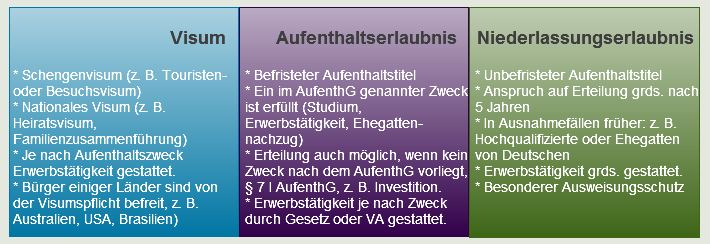Federal Administrative Court, August 16, 2011, Case No.: 1 C 12.10
Section 28 of the Residence Act regulates family reunification for German citizens. According to Section 28, Paragraph 2 of the Residence Act, a settlement permit is generally to be granted to a foreigner if they have held a residence permit for three years, the family union with the German citizen continues in Germany, there are no grounds for deportation, and they can communicate in German on a basic level. Furthermore, the residence permit is extended as long as the family union persists.
Section 28.2.1 of the General Administrative Regulation to Section 28 of the Residence Act stipulates that the granting of a settlement permit must be refused if there is a reason for mandatory refusal according to Section 5, Paragraph 1 of the Residence Act.
According to Section 5, Paragraph 1 of the Residence Act, the granting of a residence title generally requires that:
The livelihood is secured,
Unless there is a right to the issuance of a residence title, the foreigner’s stay does not adversely affect or endanger the interests of the Federal Republic of Germany for any other reason, and
The passport requirement is fulfilled.
- insofar as there is no entitlement to the issue of a residence title, the foreigner's stay does not impair or jeopardise the interests of the Federal Republic of Germany for any other reason and
- the passport requirement is fulfilled.
The requirement of securing the livelihood often leads to the refusal to grant a settlement permit if applicants rely on public funds.
According to Section 2, Paragraph 3 of the Residence Act, a foreigner’s livelihood is secured if they can cover it, including adequate health insurance, without relying on public funds.
Child benefits, child supplements, parental allowances, and public funds based on contributions or provided to enable residence in the federal territory are not taken into account.
In the decision mentioned above, the Federal Administrative Court ruled that a foreign woman must be granted a settlement permit even if she can secure her own livelihood from her income, but the income does not fully cover the needs of her children.
Facts of the Court Case
The plaintiff was an Iranian national who moved to Iran in 1996 for the purpose of Family reunification had travelled to Germany to join her then husband. The residence permit had to be renewed annually.
Since 1999, the plaintiff had been separated from her husband but lived with her two minor children, who were German citizens.
The plaintiff received supplementary unemployment benefits alongside her income.
In addition to her income as a kitchen assistant in a kindergarten, the claimant received supplementary unemployment benefit II.
In 2009, the city of Frankfurt am Main rejected the plaintiff’s application for a settlement permit due to the lack of secured livelihood for the family household.
The Hessian Administrative Court required the immigration authority to grant the settlement permit.
The Hessian Administrative Court obliged the defendant to grant the requested settlement permit under Section 28, Paragraph 2 of the Residence Act. The defendant appealed this decision to the Federal Administrative Court.
Federal Administrative Court Ruling:
The Federal Administrative Court also recognizes the plaintiff’s entitlement to a settlement permit.
The Federal Administrative Court ruled that the granting of a settlement permit for family reasons under Section 28, Paragraph 2, Sentence 1 of the Residence Act requires securing the livelihood as per Section 5, Paragraph 1, No. 1 of the Residence Act.
Thus, the livelihood of the core family living in a household – in this case, consisting of the plaintiff and her two minor children – must generally be secured.
However, this requirement only needs to be met as a rule.
No permanent residency status is granted to foreign family members whose livelihood is not secured.
The right of residency of dependent German children in the country of their citizenship cannot be further solidified.
Such an exception is considered when the applicant can secure their own needs, and a shortfall arises due to German family members – in this case, the minor children.
The same would likely apply if the applicant foreigner could not support their German spouse.
In the case of insufficient livelihood coverage, it must also be considered that there should be no discrimination against the foreigner due to the marriage, so their support for their German spouse should not be held against them.
The same should apply if the applicant foreign national is unable to provide for his or her German spouse.
In the case of a lack of maintenance cover, it should also be noted that the foreigner must not be discriminated against because of the marriage, so that the maintenance payments to his German spouse may not be held against him.
Source: Source: Federal Administrative CourtSource: Federal Administrative Court
Important Note: The content of this article has been prepared to the best of our knowledge and belief. However, due to the complexity and constant evolution of the subject matter, we must exclude liability and warranty. Important Notice: The content of this article has been created to the best of our knowledge and understanding. However, due to the complexity and constant changes in the subject matter, we must exclude any liability and warranty.
If you need legal advice, feel free to call us at 0221 – 80187670 or email us at info@mth-partner.de.




One Response
My wife had the residence permit according to § 30 since 2006, but since january 2012 the residence permit was changed according to § 28 Abs.1 Nr.3 and S.2.
My question is therefore: after the changes that occurred on 16 August 2011, Ref.: 1 C 12.10
Does my wife fulfil the conditions for obtaining a permanent residence permit?